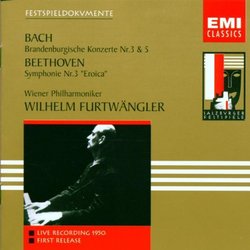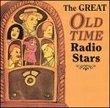| All Artists: Furtwangler, Wiener Philharmoniker, Ludwig van Beethoven, Bach Title: Beethoven: Symphony No. 3 "Eroica"/ Bach: Brandenburg Concertos No. 3 & 5 Members Wishing: 0 Total Copies: 0 Label: EMI Release Date: 3/1/2005 Album Type: Import Genre: Classical Style: Number of Discs: 2 SwapaCD Credits: 2 UPC: 724356742222 |
Search - Furtwangler, Wiener Philharmoniker, Ludwig van Beethoven :: Beethoven: Symphony No. 3 "Eroica"/ Bach: Brandenburg Concertos No. 3 & 5
 | Furtwangler, Wiener Philharmoniker, Ludwig van Beethoven Beethoven: Symphony No. 3 "Eroica"/ Bach: Brandenburg Concertos No. 3 & 5 Genre: Classical |
Larger Image |
CD DetailsSimilar CDs |
CD ReviewsUnique and moving Derek Lee | St. Paul, MN USA | 04/15/2005 (5 out of 5 stars) "I won't spend a great deal of time reviewing the Eroica here; I will just say that I have never heard a Furtwangler performance of Beethoven's Third that was not a powerful experience. This is hardly an exception. The Bach, however, is of great interest, both historical and musical. Furtwangler's Bach has always been controversial, and it's easy to hear why from these recordings. In his mind, only Beethoven could stand together with Bach, as giants of equal stature. As a result, these performances are intensely personal, and have a rugged strength which I have not heard anywhere else. Of course, the people who have the idea that the ideal Bach performance is lively, with slender, chamber music-like textures, will find these simply maddening, but if you are looking for a performance which demonstrates that Bach was a composer of great emotional power and depth, these recordings cannot be missed. Please do yourself a favor and listen to the first movement of the Fifth Brandenburg (with Furtwangler himself as pianist) and see if you can deny that this is an account on the highest plane of inspiration. At the same time, Furtwangler renders the architecture of the pieces as I have heard nowhere else. Despite all the talk about period style performances having great polyphonic clarity, none of them can match this recording in making sense of the music. The performance quality is absolutely superb, with almost supernatural ensemble playing (if not for the excitement, you would swear this was a studio recording). Unfortunately the recording quality is poor, even for the time (1950), but most of the subtleties come across with great clarity (the only exception being the last movement of the Fifth concerto, which unfortunately is a little on the muddy side; you can still here Furtwangler's concept in broad terms though). I highly recommend this for anyone who wants to hear great Bach." Fascinating, but probably only for devoted collectors Santa Fe Listener | Santa Fe, NM USA | 04/20/2008 (3 out of 5 stars) "The officially endorsed Dokumente series from the Salzburg Festival has often provided us with master tapes of legendary concerts, thereby affording listeners much better sound than one gets on pirate recordings. That's not the case here, however. The master tapes from August 31, 1951, have disappeared, so EMI has remastered -- with great care, I might add -- a recording made off the radio by a listener. The results sound shallow and gritty, appealing only to those who already feel comfortable with extrremely limited AM radio sound from that era. Happily, there is no surface gritch or wobble.
That said, this concert at the close of that year's festival climaxes with one of Furtwangler's most sweeping and lofty Eroicas. I firmly believe it would rank in the top two or three from him if it weren't for the limited sonics. (For sound quality alone, the best Eroicas come from Tahra and Music & Arts.) A musician like Furtwangler, who recreates a score as he performs it, depends on the muse to strike. This Eroica, I would say, is one of those occasions. It follows the expected contour of most Furtwangler Eroicas, with its broad pacing and reaching for profound emotion in the first and second movements. Yet here the reaching goes especially deep, and soon one is pulled into the conductor's fascinating imagination. As for the Bach, I'm glad that the previous reviewer loves it so much (as does the program annotator in the booklet), because I found it unlistenable. One expects Bach from the post-war era to be slow and grand, but there are too many obstacles here: the use of a piano (playd by Furtwangler in the Fifth Brandenburg), the slow tempos and high romantic style. If you can lsiten past those obstacles, you may find more pleasure than I could. In all, I agree with specialists who rate this 1951 Vienna Phil. Eroica as one of the high points in Furtwangler's Beethoven." |


